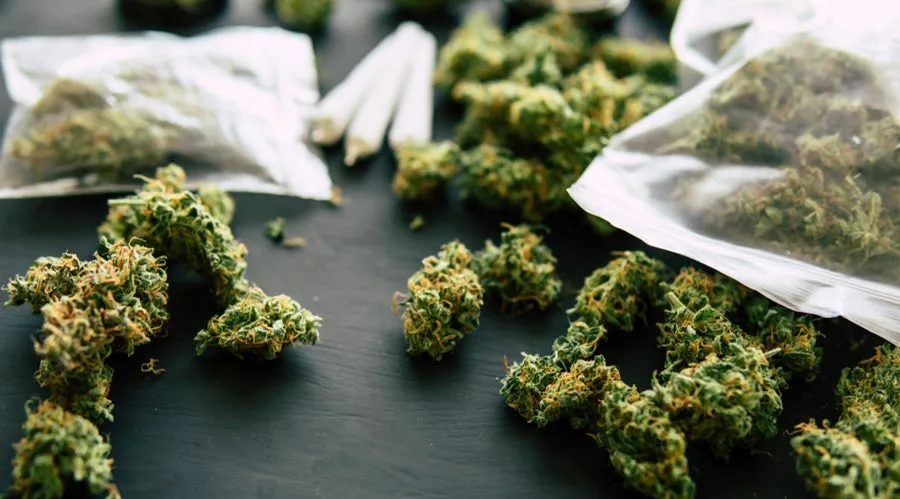Looking at Cannabis Use and its Effects on Your Brain Chemistry
Cannabis has various therapeutic uses. It promotes relaxation and may be used by individuals with insomnia or anxiety. Cannabis is also an alternative to opioid treatment of long-term pain and may be used to stimulate the appetite of individuals with eating disorders.
However, anyone who has used marijuana can also tell you that it causes drowsiness, impairs reaction time, and causes forgetfulness. This can leave you wondering, “Does weed kill brain cells?” and “Does marijuana use have any long-term effects?”
Scientists are mixed on the long-term effects of marijuana use and how it affects brain cells. Factors like a person’s age, how much marijuana they are using, the type of weed, and frequency of use all play a role.
In the article below, we’ll take a closer look at how marijuana affects brain function, whether there are lasting effects, and when marijuana habits might be a problem that can be treated effectively with the support of our services at Catalina Behavioral Health.
Get Marijuana Treatment Programs at Catalina – Call Now!
How Does Marijuana Work?
When you eat, smoke, drink, or otherwise consume marijuana, you are ingesting cannabinoids. Cannabinoids like tetrahydrocannabinol (THC) and cannabidiol (CBD) work with the same receptors in the brain and central nervous system already being used by the body.
The human brain already has cannabinoid receptors because the body produces its own type of cannabinoids, often referred to as endocannabinoids. These naturally occurring endocannabinoids are found in breast milk.
They regulate several bodily functions, including appetite, mood, sleep, immune function, pain, body temperature, fertility, memory, and learning. Weed affects how you think, feel, and act because of how cannabinoids and cannabinoid receptors affect the entire body and brain.
What Are the Short-Term Effects of Marijuana on the Brain?
The effects of marijuana can last for hours depending on how it is ingested. Even after these effects wear off, certain brain functions may be harmed for up to 24 hours after use. This includes perception of time, coordination, movement, attention, thinking, and memory function. Marijuana also has relaxing effects on the human body and improves pain regulation.
While marijuana use can affect all these things, it is still not clear that weed kills brain cells. One study tracked marijuana use in 4,000 individuals. The Coronary Artery Risk Development Young Adults study participants had cognitive abilities tested throughout their lives. There were changes in verbal memory, but executive function, processing speed, and other cognitive abilities were not affected.
For some users of cannabis, it can also cause a loss of consciousness known as greening out, which is akin to a blackout and occurs with overconsumption of marijuana products.
What Are the Long-Term Effects of Marijuana Use on the Brain?

The number of studies available on the long-term effects of marijuana is limited, likely because it wouldn’t exactly be ethical to provide marijuana to adolescents with the intent of studying how it affects them. According to the available studies, though, marijuana is most likely to affect brain development when it is used during adolescence, especially with frequent use.
Frequent and heavy marijuana use also has effects on the adult brain, though individuals may be able to improve cognitive performances when they stop smoking. Chronic exposure is more likely to have side effects than occasional use.
Does Marijuana Affect Brain Structure?
Marijuana is most likely to affect brain structure when it is consumed during adolescence. This does not mean that the average teen is going to experience these effects from smoking weed a few times with friends. Still, chronic use during a critical period of adolescent brain development can have negative effects.
For example, one study showed that cannabis use during early adulthood alters the reward center in the brain. Adult rats exposed to THC as adolescents were more likely to self-administer drugs like heroin when given the opportunity.
Additionally, structural neuroimaging tests show functional and structural changes in the hippocampus. The hippocampus is the part of the brain responsible for learning, memory, and emotion. More research is needed to understand how adolescent marijuana consumption and frequent marijuana use affect developing brains.
Does Weed Kill Brain Cells?
While some scientists don’t believe that smoking marijuana causes significant differences in cognitive ability when consumed as an adult, weed use has been linked to lower IQ in some studies. Weed is more likely to cause brain cell death when used before the brain is fully developed, and stopping the consumption of cannabis can help improve cognitive function.
Researchers compared several peer-reviewed studies with the intent of determining if marijuana kills brain cells. The results were inconclusive, as some studies support the idea that weed can kill brain cells and other studies determined the opposite.
One medically-reviewed New Zealand study focused on IQ and how the developing brain was affected by frequent marijuana use during adolescence. There was a decline in verbal memory of about 4 IQ points. However, individuals who smoked marijuana as adults had similar test scores before and after use, which would support the idea that marijuana does not kill brain cells in adulthood.
Studies like this also don’t take into account the higher concentration of THC in marijuana products today and the use of multiple substances. Many studies are also limited by the lack of test results and imaging before an individual starts using marijuana.
Does Medical Marijuana Have Side Effects?

Often, individuals prescribed medical marijuana use strains with higher concentrations of cannabidiol (CBD) than tetrahydrocannabinol (THC). Both of the cannabinoids are found in marijuana, but THC is known for producing the psychoactive effects associated with the “high” from ingesting marijuana.
There are also concentrated forms of marijuana, much like the hashish of old, but even more refined and potent. A small dab of concentrated cannabis products like rosin or wax is often powerful enough to keep a user high for hours on end.
By contrast, CBD offers benefits like pain relief and relaxation without producing that same high. Medical marijuana is used to help cancer patients manage appetite and nausea after chemotherapy, reduce seizure severity and frequency in patients with seizure disorders, treat pain and muscle spasms, and more.
While it does have some side effects like dry mouth, dizziness, and fatigue, as well as the potential for dependence and addiction, marijuana is prescribed when the benefits outweigh the side effects.
What About Synthetic Marijuana?
Synthetic marijuana is a type of fake weed that is referred to as “spice” or “K2”. This type of marijuana is made using synthetic cannabinoids and it produces a very different reaction that marijuana users might expect. This form of drug abuse is much more hazardous than conventional cannabis use.
Neurological symptoms of synthetic marijuana might include dizziness, lack of coordination, agitation, difficulty concentrating, other forms of cognitive impairment, confusion, sleepiness, agitation, and even strokes and seizures.
Synthetic weed also produces psychological symptoms in people, including delusions, hallucinations, violent behavior, psychosis, and suicidal thoughts. Physically, it may cause severe nausea and vomiting, chest pain, kidney failure, tachycardia, heart attack, and even death.
More research needs to be conducted on the long-term effects of synthetic marijuana but it is an addictive substance. Individuals who stop synthetic weed suddenly after using synthetic marijuana heavily often experience withdrawal symptoms.
Confidential Marijuana Use Assessment – Call Now!
What are the Typical Effects of Marijuana on Mental Health?
Researchers do not yet fully understand the impact that marijuana has on various mental health disorders. While smaller quantities may have positive effects, higher concentrations can make certain psychiatric conditions worse.
Some people use weed as a way to self-medicate underlying mental health conditions. However, this is risky for a few reasons. Self-medicating can lead to chronic marijuana use and dependence. Long-term marijuana use makes it harder to manage day-to-day responsibilities.
Frequent weed use can also make mental health symptoms worse. It can cause psychosis, paranoia, and hallucinations in some people. Smoking weed has also been linked to social anxiety, depression, and a higher rate of suicide attempts. In individuals who use weed frequently from adolescence, there is a higher prevalence of schizophrenia.
For individuals considering addiction treatment at Catalina Behavioral Health, we offer treatment services for marijuana and other substances, as well as mental health services. By addressing both issues when they exist, long-term recovery becomes more likely.
What is Marijuana Use Disorder?
Using marijuana isn’t always considered as serious as other substance use disorders. However, some people do develop a dependence on marijuana and use it so frequently that it impacts their lives.
While marijuana’s long-term effects aren’t completely known, individuals with cannabis use disorder use it so frequently that it can impact cognitive function, affect memory, and increase their tolerance and dependence on marijuana.
How Do I Know if I Have a Problem with Using Marijuana?

Many people use cannabis across the United States, an estimated 18% of people (40.2 million Americans) in 2019. While it remains federally illegal, 24 states have regulated it for recreational (non-medical) use as of 2023. Even something that is legalized can have harmful and addictive effects, which is true with nicotine and alcohol as well. Some signs that you may be dependent on marijuana include:
- Craving marijuana when you can’t use it
- Using marijuana while driving or doing other high-risk activities
- Skipping out on time with family or friends to get high
- Needing to consume more weed to feel the same high
- Withdrawal symptoms when you stop using
- Choosing to spend more time with people that you can smoke around
- Letting marijuana use affect your ability to take care of responsibilities at work and home
Many people don’t take marijuana use as seriously as drug addiction or other substance abuse. However, long-term marijuana use can have harmful effects and it can impact your life.
Adolescent marijuana use should also be taken seriously, as weed may cause cognitive decline during adolescent brain development. Lifetime marijuana use can also harm cognitive function. All of these are reasons to consider the wisdom of stopping marijuana use.
Up To 100% of Rehab Costs Covered By Insurance
Getting Help for Marijuana Use Disorder at Catalina
According to the statistics, marijuana use is more common than other illicit drug use in the United States. Even with its high rate of usage, not everyone can use marijuana without becoming dependent on it. This dependency can cause problems at work, at home, and in relationships. But detox for cannabis and treatment support are available and effective.
If you believe that weed use is affecting your life, or you or a loved one are struggling with marijuana use disorder and struggling to quit, give our team at Catalina a call. Take back control of your life and start on the road to health and recovery today!





